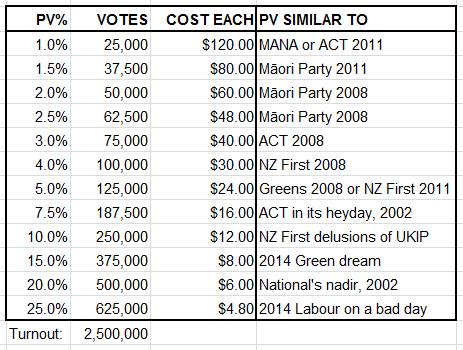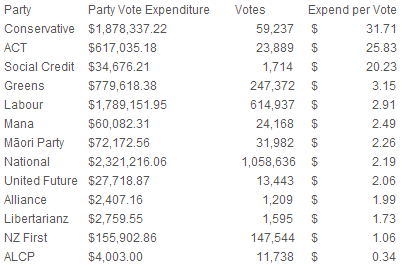Phil Sage in comments to my previous post about Internet MANA observes that “The question is whether Kim Dotcom’s money will translate into poll support and votes.” I have no knowledge of what’s going on inside the Internet MANA HQ bar what’s been reported in the media, but those reports indicate a large full-time campaign staff, and that will burn a large share of the money. Matthew Hooton was on the wireless yesterday scorning this approach and saying the money will be pumped into glossy brochures and Internet ads nobody will watch. Which might be fair enough.
But wait, we actually have some data! Each election, David Farrar helpfully puts together a breakdown of party votes won versus dollars spent (CPV). The 2008 and 2011 tables were stolen from DPF, with thanks.
In 2011, almost all parties spent less than $5 per vote — exceptions were the Conservatives ($32), ACT ($26) and Social Credit ($20).
In 2008 the expenditure was higher and the field more spread, probably because the result was less certain and the stakes higher. (EDIT: Also, it appears the broadcast allocation was not included in the 2011 figures). The two main parties again spent less than $5, most others spent $10-15, and there were two outliers — RAM ($49) and Social Credit ($55).
Internet MANA in 2014
Turnout in both those elections was famously modest (2.2-2.4 million). Since both Labour and Internet MANA are trying to mobilise the “missing million” let’s assume turnout increases to 2.5 million in 2014, which yields a nice round 25,000 party votes per 1%. Let’s also assume that Internet MANA only spends the $3 million put in the pot by Kim Dotcom, which in reality will be higher.

The first point here is that high polling tends to correlate with low CPV. Incumbency and brand value count for a great deal. So it is unlikely that any new party would be able to achieve good CPV by any means. To match the major parties Internet MANA would need to poll 25%, in which scenario Labour would effectively cease to exist. Even though that’s only a little over half of the “missing million”, it’s not happening.
My guess in the post was that Internet MANA would get 2-3% for $3 million. That would mean per-vote spending of around $50, far higher than any of the parties in 2011, on a par with the unelectable outliers in 2008. I still think that’s the most likely outcome.
If they tank and gain only what the combined Internet and Mana parties are polling now (1-1.5%) they would have outspent 2011’s most profligate parties by a factor of three in terms of CPV. This has to be the worst conceivable outcome for Internet MANA, and even so, it very probably yields them a second MP, assuming either Hone Harawira or Annette Sykes wins their seat. Anything more than this is gravy. Te Mana teaming up with Kim Dotcom is, at least tactically, a no-lose situation.
If they match 2011 CPV outliers the Conservatives, they would need to pull at least 100,000 votes — a tenth of their missing million — which would yield 5-7 MPs and make them a force to be reckoned with between now and 2017, giving them a platform to profoundly disrupt the plans of every other party in NZ politics. It’s unlikely, but with this sort of money, it’s not impossible.
UPDATE: Andrew Geddis points out in comments that I’ve failed to account for the electoral spending limit, which prevents Internet MANA from blowing the whole $3 million on declarable election expenses, which is what the cited 2008 and 2011 numbers cover. The expenditure limit is $25,700 for a constituency candidate and $1,091,000 for a registered political party plus $25,700 per electorate contested by the party.
So all the CPV figures in that last table are about double what they will be in reality, which means the premise and conclusions of this post are rather weaker than they seemed.
L


